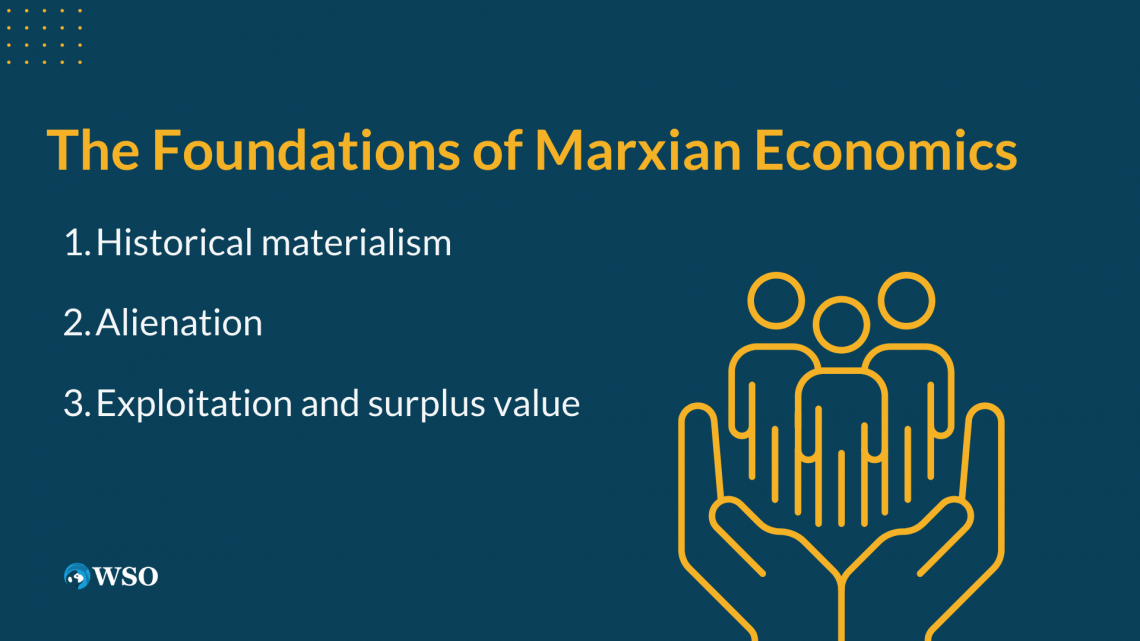Marxian Economics
Marxian economics focuses on the analysis of capitalist societies, exploring elements such as class struggle, the exploitation of the working class, and inherent contradictions within the capitalist system.
What Is Marxian Economics?
Marxian economics is a comprehensive economic framework that studies the functions of capitalist societies through the lens of class struggle, exploitation, and the contradictions ingrained in capitalism and its field of production.

It is a critical and alternative approach to traditional neoclassical economics, challenging the assumptions and principles of capitalist economies. Marxian economics’ primary goal is to uncover the underlying power relations and economic inequalities within capitalist systems.
Marxian economics studies the classical approach to economics, developed by Adam Smith, which provides a different economic perspective. It is designed to allow the populous to understand the complex dynamics of modern economics and its varying distinctions.
By examining class struggle and the production methods characteristic of capitalism, Marxian economics strives to pave the way toward a more equitable society. Its ultimate objective is to critically review the capitalist system and advocate for a socialist revolution.
Key Takeaways
- Marxian economics focuses on the analysis of capitalist societies, exploring elements such as class struggle, the exploitation of the working class, and inherent contradictions within the capitalist system.
- Marxian economics challenges the current economy in relation to neoclassical economics to uncover power dynamics and inequalities.
- Marxian economics seeks to promote a more fair and just society by critically examining capitalism and advocating for a socialist revolution.
Marxian Economics Historical Context
Marxian economics arose during the Industrial Revolution when significant colonial and economic transformations occurred. During this time, Karl Marx witnessed the exploitative nature of capitalism, where the working class faced harsh working conditions, low wages, and widening inequality in overall income.

Witnessing such aspects of the economy helped him better understand how capitalism works throughout society. Motivated by social injustices, Marx sought to develop a comprehensive framework to unveil the capitalist system's inherent contradictions and exploitative mechanisms.
Thus, Marxian economics was born, serving as a sophisticated means to delve into the workings of capitalism and advocate for a more equitable society.
Through examining capitalism, Marxian economics aims to reveal how the system can be exploitative and contribute to social inequalities.
This is accomplished by studying the interactions between different social classes, the extraction of value from labor, and the cyclic patterns of growth and crisis in the economy.
By shedding light on the flaws of capitalism, Marxian economics plays a massive role in ensuring the populace is educated on the state of the economy.
Marxian Economics: Labour Theory of Value
In Marxian economics, the labor theory of value is a central concept that asserts the value of a commodity is derived from the socially essential labor time invested in its production.

In capitalist societies, commodities are exchanged in the market. Marx proposed that in the exchange process, commodities are compared and valued based on the amount of labor embedded in them.
For instance, let's consider a scenario where one commodity requires more production time than another. In such a case, the commodity requiring more production time would have a higher valuation.
To illustrate this further, let's consider a scenario where one commodity requires twice the production time compared to another. In such a case, the commodity with the longer production time would be valued twice as the other commodity.
Thus, the labor theory of value implies that the price of an exchangeable item is determined by the amount of labor input rather than the intrinsic qualities of the commodity itself.

Additionally, the labor theory of value highlights the exploitative nature of capitalism. Workers, who actively contribute their labor power to the production process, often receive wages far below the actual value they generate through their labor.
The difference between the value created through labor and the wages paid to workers is known as surplus value. Capitalists, who own the means of production, appropriate this surplus value as profit.
Class Struggle in Marxian Economics
In Marxian economics, the idea of class struggle is given great importance as a key driver of historical progress. It identifies two prominent classes in capitalist societies: the bourgeoisie (capitalist class) and the proletariat (working class).

The bourgeoisie holds ownership and control over the means of production. They utilize this power to exploit the proletariat's labor to accumulate wealth and maintain their privileged position in society.
This makes it clear that class struggle emerges due to the contrasting interests of the bourgeoisie and the proletariat.
The bourgeoisie seeks to maximize profits and maintain control over the means of production. At the same time, the proletariat struggles for better work conditions, higher wages, and improved quality of work-life balance.
He later argued that this conflicting relationship between the bourgeoisie and the proletariat would eventually lead to a revolutionary struggle. He also realized that exploitation would eventually lead to class consciousness and sentiments.
As analyzed, Marxian economics explores class struggle beyond the confines of economics, delving into its social and political dimensions. It reveals the power dynamics and conflicts stemming from the ownership and control of productive resources.
The Foundations of Marxian Economics
The foundations of Marxian economics lay the groundwork for understanding the key concepts and principles that underlie the analysis of capitalism and the potential for social transformation.

- Historical materialism: It is a fundamental aspect of Marxian economics, offering a historical outlook on the evolution of human societies. It asserts that the material conditions of society shape the social, position, and economic structure of a given era.
- Alienation: Another crucial aspect within the foundations is alienation, which offers individuals experiences under capitalism. It shows how people experience a sense of alienation from their labor, the productions of their labor, and even their human essence.
- Exploitation and surplus value: These concepts are additional aspects of Marxian economics, highlighting the unequal power dynamics within capitalist production.
Rooted in Karl Marx’s works, Marxian economics encompasses a range of interconnected ideas and theories that aim to expose the exploitative nature of capitalism and advocate for a more equitable, classless society.
Understanding historical materialism, alienation, exploitation, and surplus value provides a solid groundwork for examining the broader critiques and transformative possibilities put forth by Marxian economic theory.
Historical Materialism
Historical materialism stands as a key concept that offers valuable insights into the development of societies and the intricate dynamics of social change. It serves as a useful framework for understanding how societies have evolved and transformed throughout history.

Historical materialism views culture as evolving through distinct historical stages, driven by changes in the material conditions of production.
According to Marx, the foundations of a society, which encompasses the tools and resources used for production and the way work is organized, profoundly influence the broader social and political systems that emerge.
Essentially, Marx's perspective highlights the significant impact of the economic structure on the formation of a society's political, legal, and cultural systems.
This dynamic relationship between the economic base and the broader superstructure forms the fundamental basis of historical materialism, providing valuable insights into the development of societies.
Historical materialism identifies several major historical stages that have progressed through:
- Primitive Society: Small, nomadic groups.
- Ancient Society: Marked by the rise of early civilizations.
- Feudalism: A hierarchical system where lords and serfs were the ruling class.
- Capitalism: Driven by both private ownership of resources and market competition.
- Socialism/Communism: A transitional stage towards communism where the means of production are collectively owned.
Each stage signifies a unique mode of production and class relations. Marx firmly believes that capitalism's exploitative characteristics and inherent class conflicts would inevitably pave the path toward socialism and communism.
This transition would form a society where social classes no longer exist, fostering a more egalitarian and inclusive system for all.
Alienation
Another foundational concept in Marxian economics is alienation. Marx emphasized the alienating effects of capitalism on workers and their relationship to the results of their labor.

Alienation refers to the loss of control and estrangement that workers experience under capitalism.
The capitalist system creates a distinct divide between workers, and the privately owned means of production leads to a profound consequence. This separation robs workers of their autonomy and control over their labor.
In the capitalist framework, workers are compelled to exchange their labor for wages, resulting in a disconnect between their work and the products they contribute to creating.
Workers have no say in how these products are used, distributed, or consumers. They are reduced to being mere instruments of production, with their labor serving as a means to generate profits for the capitalist class.

Marx also identified alienation in the realm of social relations. Capitalism fosters competition and individualism, leading to a breakdown of communal ties and solidarity among workers. Pursuing self-interest and profit maximization isolates individuals and errors meaningful social connections.
Additionally, Marx emphasized the concept of alienation from one's human nature. He posited that work played a crucial role in human existence, enabling individuals to manifest their creativity and realize their full potential.
However, under capitalism, work becomes a source of pure exploitation, leading to the alienation of workers from their essential human nature.
Exploitation and Surplus Value
Exploitation and surplus value are central concepts in Marxian economics that shed light on how capitalism operates and the unequal distribution of wealth. According to Marx, the bourgeoisie class exploits the proletariat class by extracting surplus value from their labor.

Surplus value is extracted because, within the capitalist framework, workers are granted low wages in return for their labor contributions. This makes it hard for workers to fulfill their basic needs adequately.
This shows that workers are not appreciated for their value but rather for the value they create through labor. This disparity between the value of labor and wages received gives rise to surplus value, which capitalists exploit as profit, accumulating wealth and capital at the expense of the working class.
Marxian economics views this exploitation as inherent to the capitalist system, as capitalists continuously strive to maximize their profits by paying workers less than the value they create.
This is why understanding the concept of exploitation and surplus value helps to uncover the underlying mechanisms of inequality and class divisions within capitalism.
It highlights the fundamental contradiction between the social nature of production, where workers collectively create value, and a small capitalist class's private appropriation of that value.
Marxian Economics vs. Classical Economics
Marxian economics presents a distinctive departure from classical economics, championed by economists like Adam Smith and his contemporaries.

Classical economists upheld that a free market benefits society, but Marxian economics begs to differ.
| Marxian Economics | Classical Economics |
|---|---|
| Challenges the notion that a free market benefits society as a whole. | Upholds the belief that a free market benefits society as a whole. |
| Highlights the exploitation of the laboring class by the capitalist elite. | Emphasizes the efficiency and productivity of individual economic decision-making. |
| Critiques capitalism and advocates for a more equitable distribution of resources. | Supports capitalism and the role of private ownership in wealth accumulation. |
| Focuses on the concept of value and the concentration of wealth and power. | Emphasizes the role of profit accumulation and investment in economic growth. |
| Advocates for an active role of the state in guiding and managing the economy. | Advocates for minimum government intervention and the importance of market mechanisms. |
| Centers on the analysis of social class dynamics and conflicts of interest. | Focuses on the efficiency and allocative outcomes of market interactions. |
| Predicts the eventual demise of capitalism and the rise of a socialist revolution. | Does not anticipate a fundamental transformation of the economic system. |
Conclusion
Marxian economics provides a comprehensive framework that challenges classical economics's presumptions and delves into capitalism's exploitative nature.

By emphasizing principles such as the labor theory of value, the ongoing struggle between different social classes, the feeling of being disconnected, and the contradictions within capitalism, it offers valuable insights into the inner workings of economic systems.
Marxian economics has many lasting contributions, including the importance of social class and its influence on economic outcomes. By highlighting the exploitation of the proletariat (working class), it sheds light on the unequal distribution of wealth and power.
It exposes how surplus value is extracted from workers, leading to income inequality and social stratification.
Additionally, it underlines the role of the state and government intervention in shaping economic conditions. While classical economics often favors minimal state intervention and laissez-faire policies, Marxian economics identifies the need for active state involvement to ensure parity.

This perspective has informed various social and political movements advocating for labor rights, special welfare programs, and more equitable allocation of resources.
Another influential aspect of Marxian economics is its critique of alienation under capitalism. Marx contended that production methods diminish workers' autonomy and transform them into insignificant parts of a larger mechanism.
By exploring the alienation and estrangement of labor, Marxian economics accentuates the dehumanizing effects of capitalism and calls for alternative economic systems that prioritize human well-being and self-actualization.
Its relevance extends beyond its theoretical contributions. It has encouraged social movements, political ideologies, and academic debates centered around economic justice and transformative change.

Marxist views continue to inform discussions on income inequality, globalization, worker rights, imperialism, and the environmental consequence of capitalism.
Critically examining capitalism's intrinsic paradoxes and predicaments invites us to question the status quo and envision alternative economic systems that promote social equity and sustainability.









or Want to Sign up with your social account?